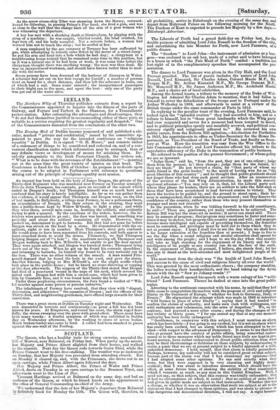IRELAND.
The Northern Whig of Thursday publishes extracts from a report by the Commissioners appointed to inquire into the fitness of the ports of Galway, and Foynes and Tarbert in the Shannon, for a Transatlantic packet-station. After estimating the advantages and disadvantages, they "do not feel themselves justified in recommending either of these ports as suitable to a service requiring the greatest regularity and despatch." One of the Commissioners dissented from the conclusions of the other two.
The .Evening Mail of Dublin became possessed of and published a cir- cular, marked " private and confidential," issued by the committee ap- pointed to pave the way for the intended conference on " religious equality" in Dublin. It is signed " G. H. Moore," and consists rather of a statement of things to be considered and reflected on, and of a con- venient classification under which information may be arranged, than of any definite views or development of means for attaining them. De- cidedly antagonistic to the Irish Protestant Church, the writers ask, " What is to be done with the revenues of the Establishment ? "—pointing out at the same time the great variety of opinion on that head. The Conference is fixed for the 28th of October : its purpose is to decide upon the course to be adopted in Parliament with reference to questions arising out of the principle of religious equality next session.
An inquest has been held on the body of James Deegan, the private of the Thirty-first Regiment who was murdered near Fermoy on Tuesday sennight. Private John Thompson, his comrade, gave an account of the assault which ended in Deegan's death ; but Thompson himself was so much hurt and confused that his story is barely intelhgible. As far as we can gather from his evidence, it would appear that Thompson and Deegan went, on the 21st of last month, to Ballyhooly, a village near Fermoy, to see a policeman there, an acquaintance of Deegan. On their return in the evening, they went into a public-house kept by Widow M'Grath, to light a pipe ; and while they were there, several men came in, hustling the soldiers, and evidently trying to pick a quarrel. By the exertions of the widow, however, the in- truders were persuaded to go out ; the door was barred, and something was probably said about the soldiers' remaining all night. However, they pushed on, determined to get to barracks. But they had not gone far before Deegan was struck on the head by a stone. He remonstrated with the as- sailants, eight or ten in number. Here Thompson's story gets confused. He would seem to have been separated from his comrade, and both appear to have crouched down to avoid the stones. Ultimately, we find Thompson helping Deegan out of "a hole" ; the assailants moving oft; Thompson and Deegan walking back to Mrs. M'Grath's, but unable to get the door opened. They were again attacked, and Deegan was knocked down ; Thompson lying down out of the way. When he got up he found his comrade speechless ; and returning to barracks, he himself was found to be very seriously cut in the face. There was no other witness of the assault. A man named Fitz- gerald deposed that he found the body in the yard, and gave the alarm. Another witness, lodging at Mrs. M'Grath's, saw the slight scuffle which took place in the public-house ; but he heard no stone-throwing or rapping at the door afterwards. The surgeon of the Thirty-first stated that Deegan had died of a punctured wound in the nape of the neck, which severed the spinal cord. Deegan had with him a sword-cane, which had been given to him by Constable Rice, and it was found bent beside the body. Under these perplexing circumstances, the Jury found a verdict of " Wil- ful murder against some person or persons unknown."
The inhabitants of Fermoy have resolved, that they view with "disgust, detestation, and abhorrence' the assassins of Deegan ; and the officers of the Thirty-first, and neighbouring gentlemen, have offered large rewards for their conviction.
There was a great storm at Dublin on Tuesday night and Wednesday. The rain descended in torrents and continuously—so great a fall has not been known for years. At Kingstown, and round the coast, the storm raged fear- fully, the waves sweeping over the piers with grand effect. There must have been many wrecks : a fearful symptom of which was exhibited in Dublin Bay on Wednesday afternoon, by the washing to shore of seven bodies. Much broken timber also came to land. A collier had been smashed to pieces against the sea-wall of the Poolbeg.


























 Previous page
Previous page